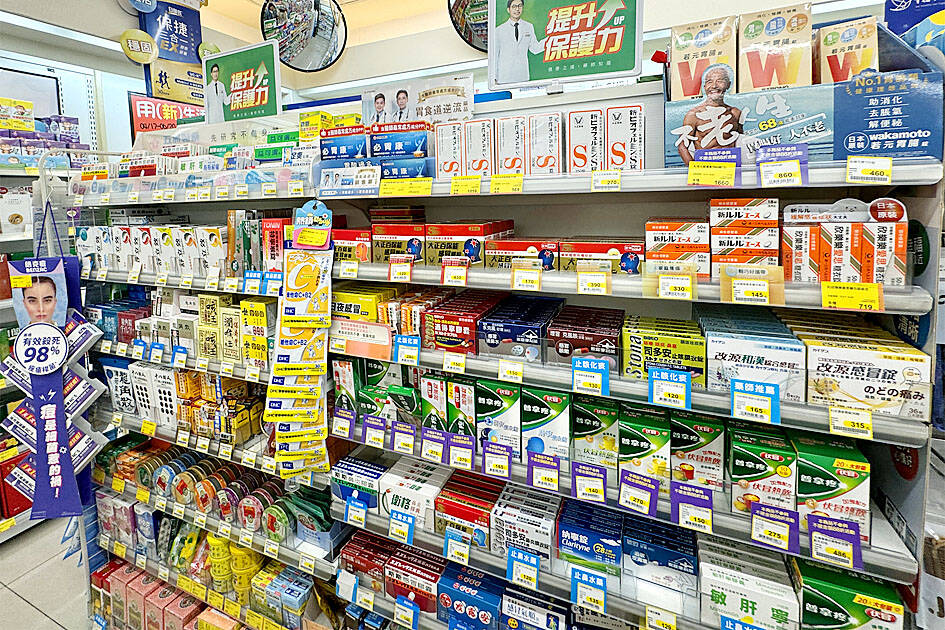Buying medicines online could lead to a prison sentence of up to 10 years and a fine of up to NT$100 million (US$3.09 million), the Food and Drug Administration (FDA) said yesterday.
Pharmaceuticals are not like other products, and only over-the-counter drugs are allowed to be purchased online — the third of the three medicine classifications, following prescription drugs and behind-the-counter drugs, FDA Deputy Director-General Wang Te-yuan (王德原) said.
This includes products such as Green Oil and Tiger Balm, he said.

Photo: Chiu Chih-jou, Taipei Times
However, buying aphrodisiacs, weight loss drugs or foreign medicines online is illegal, he said.
There is not only the risk that they could be counterfeit, but it could also be considered importing drugs in contravention of the Pharmaceutical Affairs Act (藥事法), Wang said.
Under Article 82, those who import prohibited drugs are subject to up to 10 years in prison and a fine of no more than NT$100 million.
Illegal online retailers often use the names of legal manufacturers or pharmacies, or recommendations from well-known celebrities, to sell products, FDA Medicinal Products Division head Chung Chi (鍾綺) said.
However, as the quality, safety and efficacy of these drugs has not been certified, the user cannot apply for compensation if taking them results in adverse effects, Chung said.
The FDA is working with the Customs Administration to enhance inspections of incoming packages and monitor the Internet for illegal retailers, she said.
Regardless of whether the buyer plans to use the drugs or sell them, importing unapproved drugs is treated the same way under the law, she added.
The FDA on its Web site regularly updates a list of vendors selling pharmaceutical products illegally online, which can be found under the banner “False Food and Drug Ads” (食藥膨風廣告專區).
Approved products come with a certification number on the packaging, Taiwan Young Pharmacists’ Group executive Chang En-hao (張恩豪) said.
Chang advised caution if the number is unclear, instructions for use seem unusual or if the packaging uses simplified Chinese.
When needing medication, people should consult a doctor or pharmacist rather than buying drugs online, he said.

The Coast Guard Administration (CGA) yesterday said it had deployed patrol vessels to expel a China Coast Guard ship and a Chinese fishing boat near Pratas Island (Dongsha Island, 東沙群島) in the South China Sea. The China Coast Guard vessel was 28 nautical miles (52km) northeast of Pratas at 6:15am on Thursday, approaching the island’s restricted waters, which extend 24 nautical miles from its shoreline, the CGA’s Dongsha-Nansha Branch said in a statement. The Tainan, a 2,000-tonne cutter, was deployed by the CGA to shadow the Chinese ship, which left the area at 2:39pm on Friday, the statement said. At 6:31pm on Friday,

The Chinese People’s Liberation Army Navy’s (PLAN) third aircraft carrier, the Fujian, would pose a steep challenge to Taiwan’s ability to defend itself against a full-scale invasion, a defense expert said yesterday. Institute of National Defense and Security Research analyst Chieh Chung (揭仲) made the comment hours after the PLAN confirmed the carrier recently passed through the Taiwan Strait to conduct “scientific research tests and training missions” in the South China Sea. China has two carriers in operation — the Liaoning and the Shandong — with the Fujian undergoing sea trials. Although the PLAN needs time to train the Fujian’s air wing and

Taiwanese celebrities Hank Chen (陳漢典) and Lulu Huang (黃路梓茵) announced yesterday that they are planning to marry. Huang announced and posted photos of their engagement to her social media pages yesterday morning, joking that the pair were not just doing marketing for a new show, but “really getting married.” “We’ve decided to spend all of our future happy and hilarious moments together,” she wrote. The announcement, which was later confirmed by the talent agency they share, appeared to come as a surprise even to those around them, with veteran TV host Jacky Wu (吳宗憲) saying he was “totally taken aback” by the news. Huang,

The American Institute in Taiwan (AIT) put Taiwan in danger, Ma Ying-jeou Foundation director Hsiao Hsu-tsen (蕭旭岑) said yesterday, hours after the de facto US embassy said that Beijing had misinterpreted World War II-era documents to isolate Taiwan. The AIT’s comments harmed the Republic of China’s (ROC) national interests and contradicted a part of the “six assurances” stipulating that the US would not change its official position on Taiwan’s sovereignty, Hsiao said. The “six assurances,” which were given by then-US president Ronald Reagan to Taiwan in 1982, say that Washington would not set a date for ending arm sales to Taiwan, consult